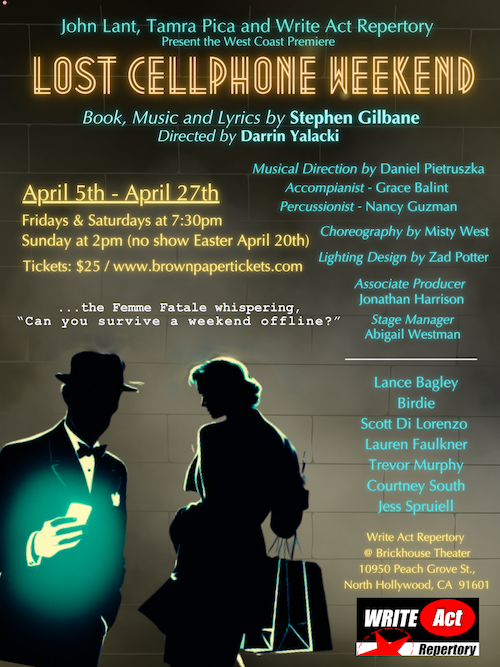Venus in Fur
Reviewed by Deborah Klugman
Jacaranda Collective at Atwater Village Theatre
Thru May 21
Note: This production company does not check for vaccination status and many people in the audience did not wear a mask the night I attended.
David Ives’s Venus in Fur is a complex erotic work that deals not just with the commingling of sex and power and the subjugate role of women in traditional relationships; it’s also about the propensity of human beings to deny feelings in themselves that are either too deeply rooted and/or too painful to acknowledge.
A secondary theme is our ever-recurring question about authorship: How much or how little of what is written is true of the person who wrote it?
Directed by Evan Isaac Lipkin at Atwater Village Theatre, the play is a two-hander built around a steamy encounter between Thomas (Roland Ruiz), a well-known playwright/director looking for an actress to cast in his latest play and Vanda (Sam Bianchini), an unpromising latecomer to the audition who ultimately bestows the doubting, dismissive Thomas with far more than he’d bargained for.
Thomas’s script draws inspiration from an 1870 novella by Austrian novelist Leopold Sacher-Masoch (whose surname served as origin for the term “masochism” when it was coined by Austrian psychiatrist Richard von Krafft-Ebing in 1886). In the book— reportedly based on Sacher-Masoch’s personal adventures with his mistress — a man named Severin Kushemski pleads with a woman with whom he’s enamored to humiliate and beat him. Once persuaded, she comes to enjoy the role of dominatrix and continues to elaborate on ways and means to torment him until, finally, he’s had enough.
In Ives’ script too, there is transformation. Blunt, bedraggled, and ostensibly uneducated when she first appears, Vanda, with script in hand, is transformed. Not only does she become irresistibly provocative and sexually commanding, but she also proves a quick study. Already, she knows all the lines in Thomas’s play. She can appreciate where it parallels Greek mythology to reflect on gender and power and the battle of the sexes. She’s heard of The Bacchae, Euripides’ classic in which female followers of Dionysius tear an errant king to pieces and argues for the inclusion of Venus in Thomas’s narrative.
And, she’s come with costumes! From her oversized satchel she pulls out one piece of essential costuming after another: a vintage 19th century dress for herself, a period smoking jacket for Kushemski, an ersatz fur with which to drape her scantily clad body.
Thomas is dazzled.
Once they’ve begun to read, Thomas finds he cannot stop. Throughout, he and Vanda slip fluidly between interacting as themselves in the here and now and depicting the characters in the script, who engage in increasingly more dangerous BDSM. As the scenes grow more intense, the line between reality and fantasy begins to blur, then disappears altogether. And what began as a comedy-laced encounter between two people in an audition studio has morphed into a pitch-black, larger-than-life scenario steeped in myth and the supernatural.
It’s all quite electrifying when done right. And not nearly as interesting when it isn’t.
Alone on stage, Ruiz is a convincing Thomas (and remains so to the end). He’s a playwright/director with attitude, frustrated that he can’t find an actress “woman” enough to fill the role in his play. Then Vanda enters, soaked to the skin from the thunderstorm outside and alternately beseeching and aggressive as she pleads for a chance to audition. Bianchini is good in this scene, which plays well for the first ten or 15 minutes at the top.
But after, things on stage fall apart. As the dominatrix, Bianchini employs a stern voice and a domineering mien. She casts imperious or scornful glances at the steadily more enthralled, submissive Thomas. She parades around the proscenium in scathingly hot, libidinous lingerie, flourishing her imaginary whip or birch rod. She looks the part.
But — there’s no fire up from the belly. Missing from this performance is the volcanic rage and insane internal abandon that would drive a chimerical character like this one to tear a man apart.
I suspect direction has something to do with this, given other missteps. For example, Lipkin stages the play with the audience seated on opposite sides of the room. Much of the time the actress’s back was to me and I could not see her face.And, for an extended stretch, while the actors were supposedly reading from Thomas’s script, they did not touch; instead, they stood face to face while delivering their lines (intimacy choreographer, Carly D. Weckstein). Imagine, for example, if she had been all over him, overwhelming him with the proximity of her sex. How much more dynamic that would have been. Ruiz, to his credit, works relatively successfully against the odds to sustain Thomas’ sexuality, though he’s largely abandoned in his efforts by the staging.
Tech is limited but adequate for a production with liimted resources. Matt Richter’s lighting is effective on the production’s modest uncredited set, and the sound design (also uncredited) works as well.
Atwater Village Theatre, 3269 Casitas Ave., Atwater. Thurs.-Sat., 8 pm, Mon., May 16, 8 pm; thru May 21. Running time: approximately 95 minutes with no intermission. venusinfurla.com














